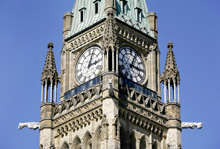
If there was any doubt the upcoming federal budget would be a low-key affair, the Harper Conservatives erased it Monday by announcing plans to deliver their new spending plan during the Winter Olympics.
Finance Minister Jim Flaherty said he’ll table the budget on Feb. 11, when many Canadians are likely to be focused on Sochi and hoping for gold-medal performances from their would-be Olympic heroes.
New Democrat Leader Tom Mulcair quickly accused the Conservatives of seeking to avoid public scrutiny of what he predicted would be a no-news, austerity-driven budget, bereft of plans or programs to help create jobs.
“People need help now and the Conservatives should be acting now,” Mulcair said.
“But it’s quite obvious that they’re holding everything in abeyance so that they can have a good-news budget next year, try to claim — without ever having to measure it — that they’re heading for a balanced budget and announce all sorts of things.”
The Conservatives are planning to post a surplus in 2015, just in time for the next election. The extra cash would allow them to pay for some long-promised election plums, including income splitting for tax purposes.
Dropping this year’s budget in the middle of the Olympics is a “triumph of politics over economic reality,” said former Liberal finance minister Ralph Goodale.
“They obviously don’t want much attention (on) this budget, so bury it when people will be paying attention to other things.”
A majority of Canadians are expected to follow the Olympics closely, albeit not as much as they did during the 2010 Games in Vancouver, suggests a new Harris-Decima poll provided to The Canadian Press.
Women’s hockey, curling, skating and speedskating are among the events on the Sochi schedule for Feb. 11, with finals in snowboarding, cross-country and freestyle skiing.
The Harper government has long touted its economic stewardship as a key strength, something Flaherty said would be underscored in the budget. But he offered no new hints as to what the document might hold.
Flaherty has, however, played down the idea that there might be some goodies coming, insisting such spending would have to wait until after the books are balanced.
“I’m not going to spend a lot of money, but I’m not the only person who makes these decisions,” he said earlier in the day after a meeting with economists.
But he said there may be more money down the road for programs like the Canada Job Grant, which the provinces have resisted, saying it would claw back existing federal funds for provincially run programs.
“There will be room for more money in the government of Canada in the next several years because we’ve been careful and we’ve paid down the deficit and we’ll be in a position to have room to move on various issues.”
But a spokesman for Employment Minister Jason Kenney said there would be no new money for the contentious skills training program.
Flaherty also waved off suggestions that the books could end up balanced a year earlier than expected, but didn’t dismiss the idea entirely.
The government takes a “substantial” $3-billion adjustment for risk, Flaherty said. But given the substantial cost of major floods in Alberta and New Brunswick this year, “we’re being prudent,” he added.
Ottawa took a $3-billion hit from the Alberta floods alone, so Flaherty has built in a cushion in order to be able to respond to future unforeseen events.
“We know we’re on track to balance in 2015-16, and we said when we ran the deficit, because of the great recession, we said we would balance in the medium term and we’ll balance in the medium term,” he said.
“But we’re going to be cautious in the meantime.”
The new budget will continue to focus on jobs and economic growth, he told the Commons.
Royal Bank economist Craig Wright said he thinks it’s feasible that the Conservatives could eliminate the deficit in the 2014-15 fiscal year, which begins in April.
“We would not be shocked to see them come into balance that year if they chose to,” Wright said.
Flaherty is projecting a deficit of $5.5 billion in the upcoming budget, along with $3 billion in reserves, Wright said. “Then you just need a small swing on any of these big measures — either revenue or expenditure — to get back in balance.”